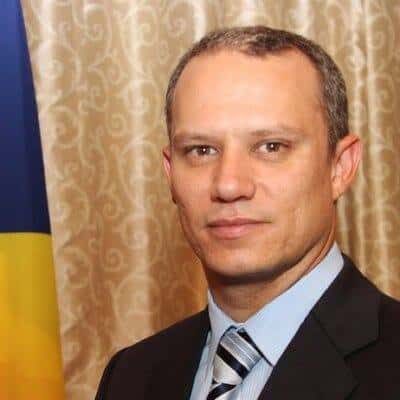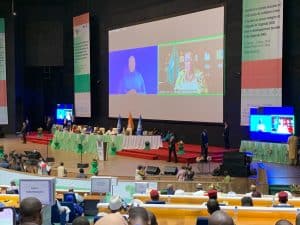On the occasion of the 9th African Regional Forum on Sustainable Development (FRADD-9) which has just ended in Niamey, Niger, AFRIK 21 spoke to Jean Paul Adam, Director of Climate Change, Environment and Natural Resources at the United Nations Economic Commission for Africa (UNECA). In this interview, the former Seychelles Minister of Foreign Affairs, outlines the challenges of achieving Sustainable Development Goal 7 (SDG 7) in Africa.
For this 9th edition, the FRADD is focusing on MDGs 6, 7, 9, 11 and 17. What is your assessment of progress towards these goals in Africa?
We are in an era of multiple crises. African countries do not have enough resources and their domestic financing capacities have been reduced, due to successive crises, notably Covid-19 and the ongoing Russian-Ukrainian war, with a very pronounced impact on value chains in terms of food and access to energy. All this has a negative impact on people and economies. In this era of multiple crises, we need to see how through a green recovery, we can enable African countries to restructure their economies around the true value of their natural resources, develop value chains so as to fully benefit from the opportunities of the African Free Trade Area (AFTA), but at the same time position themselves in a global context. This is really the place to support African countries to really take advantage of their resources.
Let’s look at Goal 7, which calls for universal access to reliable, sustainable and modern energy services at an affordable cost. Sub-Saharan Africa is still lagging behind on this goal despite its rich potential for renewable energy resources. While Cameroon has 25% access to electricity in rural areas, Niger, where we are, has only 3% according to official figures. The solutions have been known for about ten years now. What is the problem?
I think there are several elements. The first one is that we need to strengthen countries’ capacities in terms of the regulatory environment to facilitate and prioritise investments in this sector. There is also the reality of the perception of risks for investment in Africa. That is, the private sector has not been able to play the role it has in other regions, due to the poor perception of investment risk on the continent. This perception is due to insecurity, but also to the small value of a market characterised by poor populations.
But all the analyses made by the ECA show that an investment made in the energy sector has a much stronger springboard effect than in other sectors. If you invest in access to energy, it translates into an increase in gross domestic product (GDP) per capita of 30%. This means that if we really manage to create this access to electricity, to energy, it will create a multiplication in the economy. And to reduce the risk on these investments, we need to use the mechanisms that are already available through international financing, but which are little deployed in Africa. These are partial guarantees, for example. So that the private sector is supported in its investments. And of course, as I said, we must also recognise that a very transparent policy is needed in African countries to facilitate these investments.
You moderated a high-level panel on renewable energy in Africa. Do you think the continent can make a breakthrough in the production of green hydrogen? And under what conditions?
I believe that all the analyses that have been presented by regional organisations, but also by Abdou-Moumouni University based here in Niger, have shown that Africa has a strong potential in terms of renewable energy. The challenge is that there is not much research capacity on the continent. We depend a lot on researchers and scientists from elsewhere. I think the priorities are to create a regulatory framework that is conducive to research and maintain research skills in universities.
Green hydrogen is being promoted more and more, but we really need to think about an energy strategy that is adapted to the needs of each country. African countries, for example, which have enormous hydraulic resources, can create almost 100% access to energy by using these resources. But countries with very little access to energy must use all the means at their disposal.
For example, a country like Niger must necessarily resort to hydrocarbons in order to address the issue of intermittent generation, the difficulty of storage, and the price of storage. However, it is necessary to have an energy plan that aims to prioritise renewable energies in the long term. These renewable energies are currently much cheaper than hydrocarbons.
Green hydrogen is now being considered as a solution for the decarbonisation of industry in the West. Beyond production, how can Africa add value to the green hydrogen produced locally? Is Africa considering a global strategy on this subject?
Proposals are being made in this direction. Green hydrogen is just as viable as other forms of renewable energy. What countries need to do is to adapt their energy mix to the resources available. Countries without water resources can base their strategy on solar or wind power, which thrive in the desert. The Commission is currently working with other partners on modelling energy methods that will allow each country to really adapt the energy mix that is best suited to its reality.
What are the main resolutions or recommendations you would like to conclude this forum with?
I think that, first of all, we must recognise that there are many innovations that are already being made. There are many good practices, but they are still on a small scale. And to get to large scale, you need transparent investment plans. Governments must lead by example.
Investment plans must also allow for strong private sector participation. The UN Secretary General announced several weeks ago that now is the time to really make a big leap forward in implementing the SDGs. And to do that, there needs to be a stimulus in the SDGs. A green, global stimulus that prioritises the needs of developing countries.
Interview by Boris Ngounou








You must be logged in to post a comment.